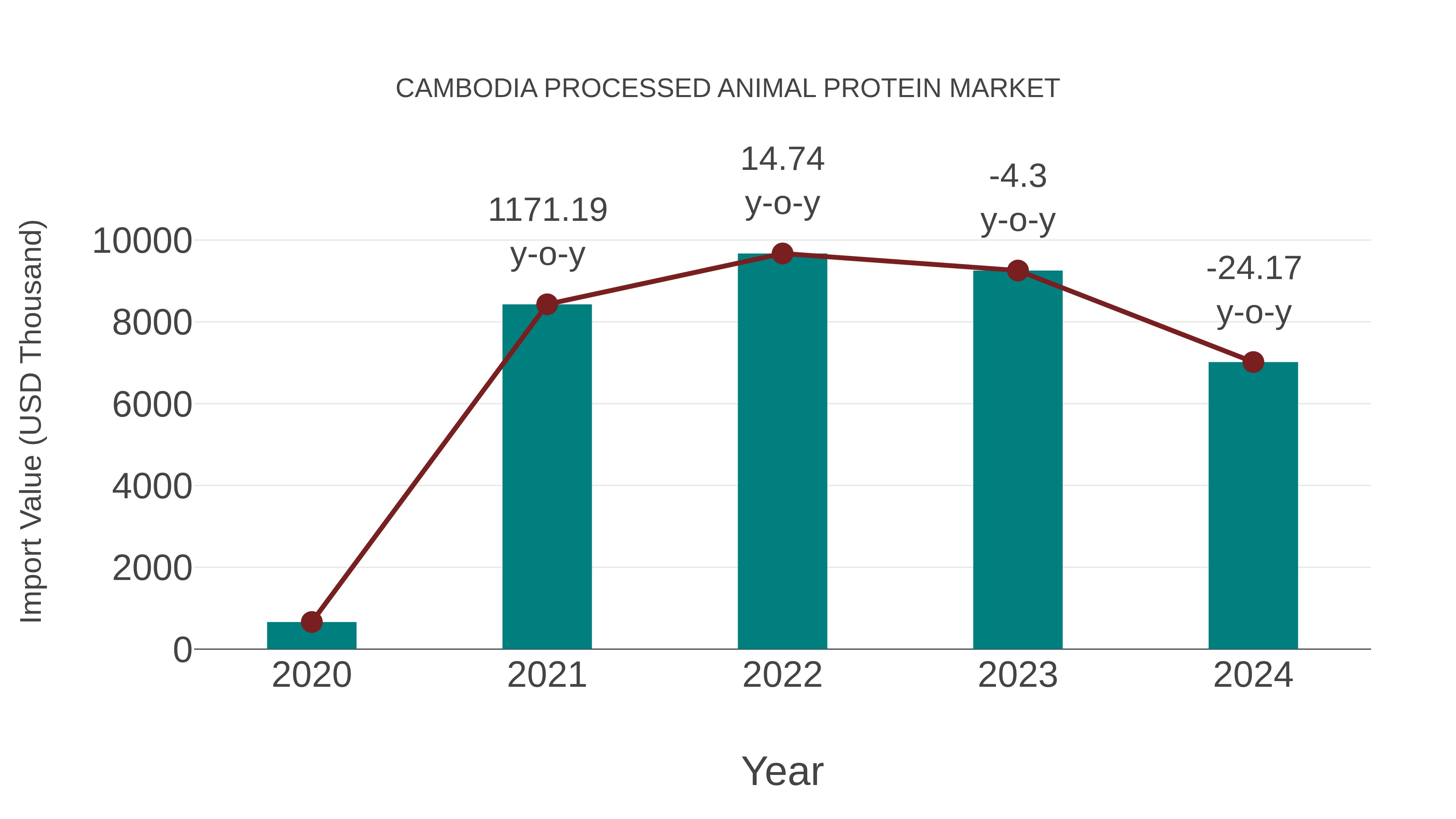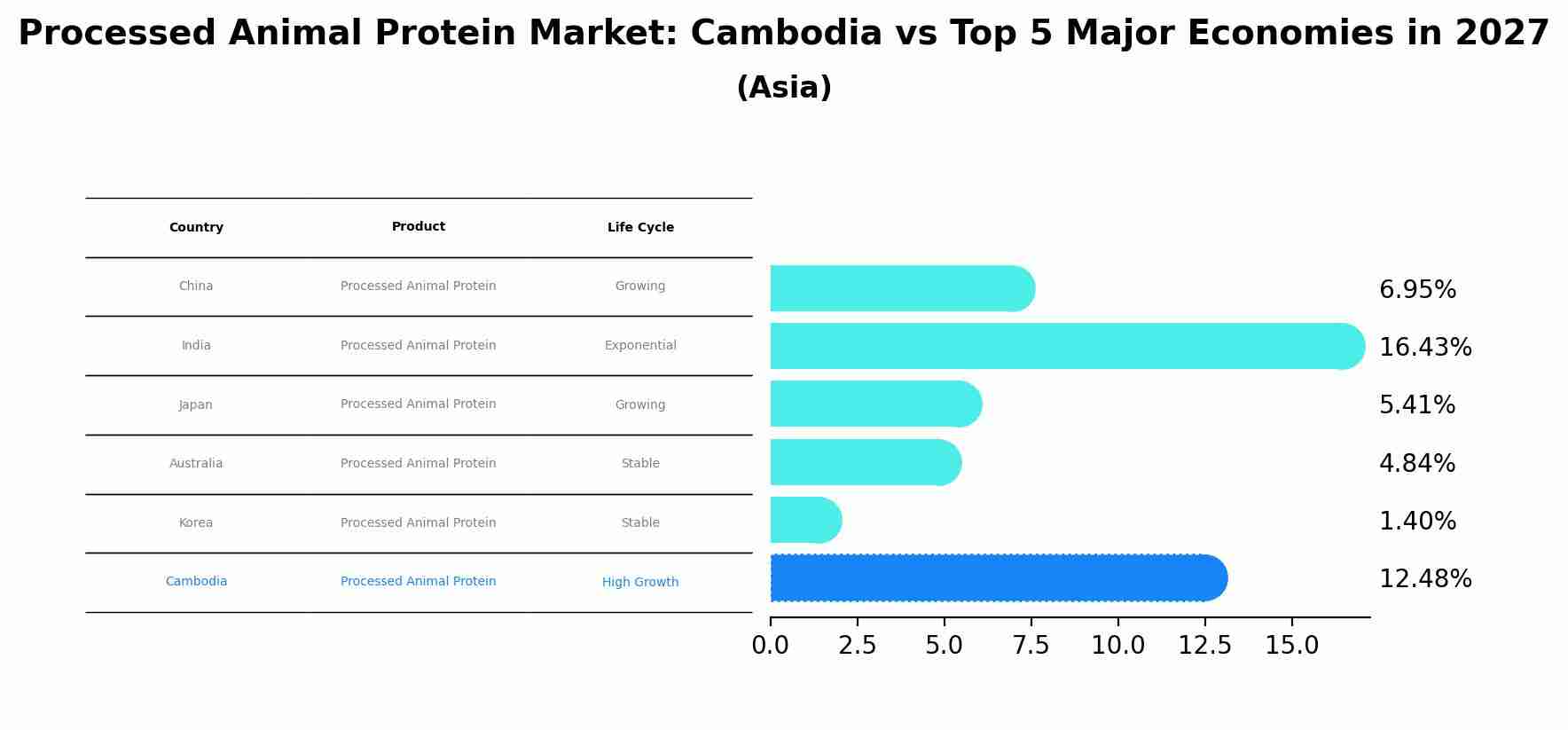Cambodia Processed Animal Protein Market (2025-2031) Outlook | Share, Companies, Value, Revenue, Industry, Growth, Analysis, Trends, Forecast & Size
| Product Code: ETC411929 | Publication Date: Oct 2022 | Updated Date: Jan 2026 | Product Type: Market Research Report | |
| Publisher: 6Wresearch | Author: Dhaval Chaurasia | No. of Pages: 75 | No. of Figures: 35 | No. of Tables: 20 |
Cambodia Processed Animal Protein Market: Import Trend Analysis
In 2024, Cambodia processed animal protein market saw a steady increase in imports. The trend reflected growing demand for processed animal protein products in the country. This rise in imports indicated a shift towards more diverse protein sources in Cambodia market.

Processed Animal Protein Market: Cambodia vs Top 5 Major Economies in 2027 (Asia)
The Processed Animal Protein market in Cambodia is projected to grow at a high growth rate of 12.48% by 2027, within the Asia region led by China, along with other countries like India, Japan, Australia and South Korea, collectively shaping a dynamic and evolving market environment driven by innovation and increasing adoption of emerging technologies.

Cambodia Processed Animal Protein Market Synopsis
The Cambodia processed animal protein market is experiencing steady growth driven by increasing consumer demand for convenient and value-added meat products. The market is characterized by a wide range of processed animal protein products such as sausages, canned meats, and frozen meat products. Key players in the market include local companies as well as international brands expanding their presence in the region. Factors such as rising disposable incomes, changing consumer preferences, and a growing urban population are fueling the market growth. However, challenges such as food safety concerns and competition from alternative protein sources are also shaping the market landscape. Overall, the Cambodia processed animal protein market presents opportunities for innovation and product development to cater to evolving consumer needs.
Cambodia Processed Animal Protein Market Trends
The Cambodia Processed Animal Protein Market is experiencing a growing demand for convenient and ready-to-eat protein products, driven by busy lifestyles and increasing urbanization. There is a noticeable shift towards healthier options, leading to a rise in demand for organic and natural protein sources. Innovative product offerings such as plant-based proteins and alternative meat products are gaining traction among health-conscious consumers. Additionally, there is a growing preference for locally sourced and sustainable protein products, reflecting the increasing awareness of environmental and ethical concerns. With the rise of e-commerce platforms and online food delivery services, companies in the processed animal protein market are focusing on enhancing their digital presence to reach a wider consumer base and capitalize on the growing trend of online shopping for food products.
Cambodia Processed Animal Protein Market Challenges
In the Cambodia Processed Animal Protein Market, some challenges include limited awareness and understanding of processed animal protein products among consumers, leading to lower demand compared to traditional protein sources. Additionally, inadequate infrastructure and technology for processing and preserving animal protein can result in quality issues and shorter shelf life, impacting market growth. Fluctuations in raw material prices, lack of standardization in production processes, and limited distribution networks also pose challenges for stakeholders in the industry. Furthermore, competition from imported processed animal protein products and regulatory hurdles related to food safety standards and certifications further complicate the market landscape in Cambodia, requiring strategic planning and investments to overcome these obstacles and drive sustainable growth in the sector.
Cambodia Processed Animal Protein Market Investment Opportunities
The Cambodia Processed Animal Protein Market presents promising investment opportunities due to the country`s growing demand for meat products and increasing disposable income levels. Investors can consider opportunities in the production and distribution of processed meat products such as sausages, ham, and canned meat to cater to the rising consumer preferences for convenience and ready-to-eat food options. Additionally, investing in modernizing existing meat processing facilities to meet international standards and improve efficiency could also yield significant returns. Collaborating with local suppliers and farmers to ensure a steady supply chain of quality raw materials can further enhance the value proposition for investors in this market. Overall, the Cambodia Processed Animal Protein Market offers potential for growth and profitability for investors looking to capitalize on the changing consumption patterns in the country.
Jordan Agar Market Government Policies
The Cambodian government has implemented various policies aimed at regulating and promoting the processed animal protein market. These policies include setting standards for the production and processing of animal products to ensure safety and quality, as well as supporting local farmers and businesses in the industry through financial assistance and training programs. Additionally, the government has imposed import restrictions and tariffs on certain animal products to protect and promote domestic production. Overall, the government`s policies in the processed animal protein market focus on ensuring food safety, supporting local businesses, and fostering a competitive and sustainable industry.
Cambodia Processed Animal Protein Market Future Outlook
The future outlook for the Cambodia Processed Animal Protein Market looks promising, driven by factors such as increasing urbanization, rising disposable incomes, and changing consumer dietary preferences towards protein-rich foods. The growing awareness about the benefits of animal protein consumption for health and nutrition is expected to further propel market growth. Additionally, advancements in food processing technologies and increasing investments in the food industry are likely to enhance the quality and variety of processed animal protein products available in the market. However, challenges such as competition from alternative protein sources and regulatory constraints may pose some hindrances to market expansion. Overall, with the evolving consumer trends and supportive industry developments, the Cambodia Processed Animal Protein Market is anticipated to witness steady growth in the coming years.
Key Highlights of the Report:
- Cambodia Processed Animal Protein Market Outlook
- Market Size of Cambodia Processed Animal Protein Market, 2024
- Forecast of Cambodia Processed Animal Protein Market, 2031
- Historical Data and Forecast of Cambodia Processed Animal Protein Revenues & Volume for the Period 2021 - 2031
- Cambodia Processed Animal Protein Market Trend Evolution
- Cambodia Processed Animal Protein Market Drivers and Challenges
- Cambodia Processed Animal Protein Price Trends
- Cambodia Processed Animal Protein Porter's Five Forces
- Cambodia Processed Animal Protein Industry Life Cycle
- Historical Data and Forecast of Cambodia Processed Animal Protein Market Revenues & Volume By Source for the Period 2021 - 2031
- Historical Data and Forecast of Cambodia Processed Animal Protein Market Revenues & Volume By Poultry for the Period 2021 - 2031
- Historical Data and Forecast of Cambodia Processed Animal Protein Market Revenues & Volume By Pork for the Period 2021 - 2031
- Historical Data and Forecast of Cambodia Processed Animal Protein Market Revenues & Volume By Beef for the Period 2021 - 2031
- Historical Data and Forecast of Cambodia Processed Animal Protein Market Revenues & Volume By Others for the Period 2021 - 2031
- Historical Data and Forecast of Cambodia Processed Animal Protein Market Revenues & Volume By Form for the Period 2021 - 2031
- Historical Data and Forecast of Cambodia Processed Animal Protein Market Revenues & Volume By Dry for the Period 2021 - 2031
- Historical Data and Forecast of Cambodia Processed Animal Protein Market Revenues & Volume By Liquid for the Period 2021 - 2031
- Cambodia Processed Animal Protein Import Export Trade Statistics
- Market Opportunity Assessment By Source
- Market Opportunity Assessment By Form
- Cambodia Processed Animal Protein Top Companies Market Share
- Cambodia Processed Animal Protein Competitive Benchmarking By Technical and Operational Parameters
- Cambodia Processed Animal Protein Company Profiles
- Cambodia Processed Animal Protein Key Strategic Recommendations
Frequently Asked Questions About the Market Study (FAQs):
Export potential assessment - trade Analytics for 2030
Export potential enables firms to identify high-growth global markets with greater confidence by combining advanced trade intelligence with a structured quantitative methodology. The framework analyzes emerging demand trends and country-level import patterns while integrating macroeconomic and trade datasets such as GDP and population forecasts, bilateral import–export flows, tariff structures, elasticity differentials between developed and developing economies, geographic distance, and import demand projections. Using weighted trade values from 2020–2024 as the base period to project country-to-country export potential for 2030, these inputs are operationalized through calculated drivers such as gravity model parameters, tariff impact factors, and projected GDP per-capita growth. Through an analysis of hidden potentials, demand hotspots, and market conditions that are most favorable to success, this method enables firms to focus on target countries, maximize returns, and global expansion with data, backed by accuracy.
By factoring in the projected importer demand gap that is currently unmet and could be potential opportunity, it identifies the potential for the Exporter (Country) among 190 countries, against the general trade analysis, which identifies the biggest importer or exporter.
To discover high-growth global markets and optimize your business strategy:
Click Here- Single User License$ 1,995
- Department License$ 2,400
- Site License$ 3,120
- Global License$ 3,795
Search
Thought Leadership and Analyst Meet
Our Clients
Related Reports
- Saudi Arabia Car Window Tinting Film, Paint Protection Film (PPF), and Ceramic Coating Market (2025-2031) | Strategy, Consumer Insights, Analysis, Investment Trends, Opportunities, Growth, Size, Share, Industry, Revenue, Segments, Value, Segmentation, Supply, Forecast, Restraints, Outlook, Competition, Drivers, Trends, Demand, Pricing Analysis, Competitive, Strategic Insights, Companies, Challenges
- South Africa Stationery Market (2025-2031) | Share, Size, Industry, Value, Growth, Revenue, Analysis, Trends, Segmentation & Outlook
- Afghanistan Rocking Chairs And Adirondack Chairs Market (2026-2032) | Size & Revenue, Competitive Landscape, Share, Segmentation, Industry, Value, Outlook, Analysis, Trends, Growth, Forecast, Companies
- Afghanistan Apparel Market (2026-2032) | Growth, Outlook, Industry, Segmentation, Forecast, Size, Companies, Trends, Value, Share, Analysis & Revenue
- Canada Oil and Gas Market (2026-2032) | Share, Segmentation, Value, Industry, Trends, Forecast, Analysis, Size & Revenue, Growth, Competitive Landscape, Outlook, Companies
- Germany Breakfast Food Market (2026-2032) | Industry, Share, Growth, Size, Companies, Value, Analysis, Revenue, Trends, Forecast & Outlook
- Australia Briquette Market (2025-2031) | Growth, Size, Revenue, Forecast, Analysis, Trends, Value, Share, Industry & Companies
- Vietnam System Integrator Market (2025-2031) | Size, Companies, Analysis, Industry, Value, Forecast, Growth, Trends, Revenue & Share
- ASEAN and Thailand Brain Health Supplements Market (2025-2031) | Strategy, Consumer Insights, Analysis, Investment Trends, Opportunities, Growth, Size, Share, Industry, Revenue, Segments, Value, Segmentation, Supply, Forecast, Restraints, Outlook, Competition, Drivers, Trends, Demand, Pricing Analysis, Competitive, Strategic Insights, Companies, Challenges
- ASEAN Bearings Market (2025-2031) | Strategy, Consumer Insights, Analysis, Investment Trends, Opportunities, Growth, Size, Share, Industry, Revenue, Segments, Value, Segmentation, Supply, Forecast, Restraints, Outlook, Competition, Drivers, Trends, Demand, Pricing Analysis, Competitive, Strategic Insights, Companies, Challenges
Industry Events and Analyst Meet
Whitepaper
- Middle East & Africa Commercial Security Market Click here to view more.
- Middle East & Africa Fire Safety Systems & Equipment Market Click here to view more.
- GCC Drone Market Click here to view more.
- Middle East Lighting Fixture Market Click here to view more.
- GCC Physical & Perimeter Security Market Click here to view more.
6WResearch In News
- Doha a strategic location for EV manufacturing hub: IPA Qatar
- Demand for luxury TVs surging in the GCC, says Samsung
- Empowering Growth: The Thriving Journey of Bangladesh’s Cable Industry
- Demand for luxury TVs surging in the GCC, says Samsung
- Video call with a traditional healer? Once unthinkable, it’s now common in South Africa
- Intelligent Buildings To Smooth GCC’s Path To Net Zero


















